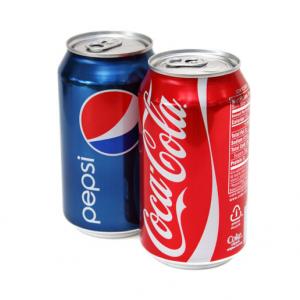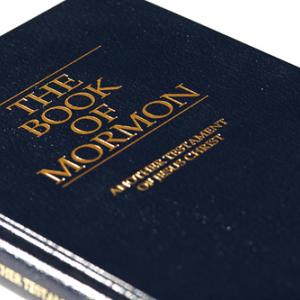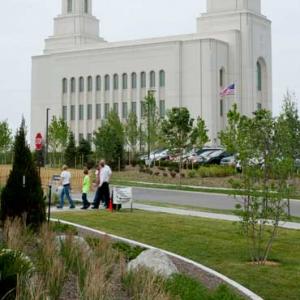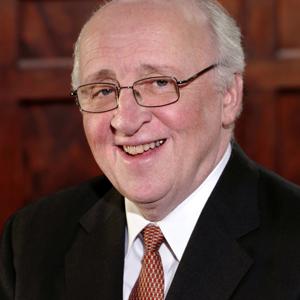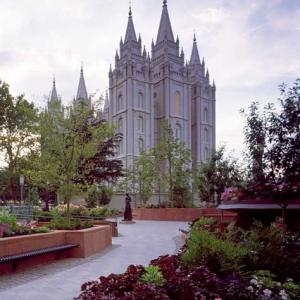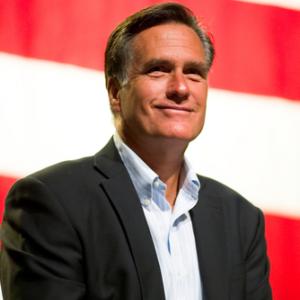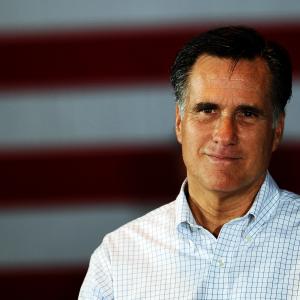Peggy Fletcher Stack writes for the Salt Lake Tribune. Her stories appear on God's Politics via Religion News Service.
Posts By This Author
Brigham Young Would Break the Mormons’ No-Beard Rule
If they were alive today, nearly half the presidents of the Church of Jesus Christ of Latter-day Saints — from Brigham Young in the 19th century through George Albert Smith in the 1940s — would be forbidden from serving in the faith’s 141 temples worldwide.
That’s because being clean-shaven is generally a requirement for men to be Mormon temple workers. Whiskers are fine for temple-going members, but even nicely trimmed beards and mustaches are no-nos for temple workers.
“It is ironic that temple workers are expected to be more clean-shaven than the deity figures — God and Jesus Christ — portrayed in LDS films and portraits,” says Armand Mauss, a leading Mormon sociologist in Irvine, Calif.
When Spouses Lose Faith, Sticking Together is Hard
SALT LAKE CITY — For years, Matt Duff was an uber-Mormon.
At 17, he ran away from home and moved in with the only black Latter-day Saints family in his New England town.
Two weeks shy of his 18th birthday, he joined the Utah-based Church of Jesus Christ of Latter-day Saints.
By 19, he was on a Mormon mission in Denver, and two years later he enrolled at Brigham Young University-Idaho, where he met his future wife, Kylee, a multigenerational Mormon with a winning smile and a guileless faith. The two married in the Salt Lake LDS Temple.
Eight years and three children later, Matt Duff stopped believing.
New Mormon Website Features Softer Tone on Gays
SALT LAKE CITY—The Church of Jesus Christ of Latter-day Saints isn't changing its tune about homosexuality, but it has launched a new website to alter the tone.
The site — unveiled on Dec. 6 and called “Love One Another: A Discussion on Same-Sex Attraction” — includes video clips of Mormon leaders as well as gay members and their families promoting compassion and understanding toward homosexuals, and encouraging everyone to be “disciples of Christ.”
“Our hope with this site is that empathy will grow in families,” LDS apostle D. Todd Christofferson says in one clip. “We’re trying to communicate that our love is inclusive, that we want to have the family remain intact, and the relationships we’ve treasured over the years to remain and to grow.”
It’s important, the apostle says, “to recognize the feelings of a person, that they are real, that they are authentic, that we don’t deny that someone feels a certain way.”
Many gay rights activists, inside and outside the LDS church, applaud Mormonism’s latest effort.
‘Mormon Moment’ Ends with a Loss — But Romney’s Religion Still Won
SALT LAKE CITY — Mormons in Utah and across the nation were thrilled by the prospect that one of their own might occupy the highest office in the land.
That won’t happen now. But Mitt Romney came closer than any other Latter-day Saint since that once-beleaguered brand of Christianity burst onto the American scene in 1830.
"For many Latter-day Saints, it was a surprise that a Mormon candidate was able to make it as far as Mitt," said Stuart Reid, a Mormon and a Republican state senator from Ogden, Utah. "He’s done more than any single person in recent church history to share with the general public what a Mormon is, putting up a very positive image about Mormons and creating interest in our faith that was unprecedented."
Despite the defeat for Romney, Mormonism came out a winner, said Philip Barlow, chair of Mormon history and culture at Utah State University.
"It developed a thicker skin in the eyes of the world," Barlow said, "and the world could see that a Mormon who runs for office isn’t, by definition, a nut case."
Overall, most observers say, the Romney candidacy was a net positive for his Utah-based faith.
12 Myths About Mormonism That Persist Despite the ‘Mormon Moment’
SALT LAKE CITY — As Americans cast their ballots and the clock ticks toward midnight in Mitt Romney’s quest for the White House, this much is clear: Americans didn’t know much about Romney's Mormon faith when this “Mormon moment” began.
Now, thousands of headlines, dozens of TV newscasts, and one Tony-winning Broadway musical later, Americans still don’t know much about Latter-day Saints and their beliefs.
But they know more. All those stories educated millions of observant Americans about The Church of Jesus Christ of Latter-day Saints. Still, some “understandings” remain misunderstandings — and many views of the religion are still skewed, exaggerated or flat-out wrong.
Here are 12 persistent myths about Mormonism.
Mormon Missionary Applications Soar: Up By 471 Percent
SALT LAKE CITY -- Mormon apostle Jeffrey R. Holland predicted that lowering the age limits for young Mormon missionaries would trigger a “dramatic” uptick in their numbers.
Turns out, "dramatic" was an understatement. Try a 471 percent jump in applications — so far.
Just two weeks since Mormon President Thomas S. Monson announced that young men could go on full-time missions for the Church of Jesus Christ of Latter-day Saints at age 18 (down from 19) and young women could go at 19 (down from 21), the Utah-based church has seen applications skyrocket from an average of 700 a week to 4,000 a week.
Mormons Lower Age for Missionaries: 19 for Women, 18 for Men
SALT LAKE CITY — Call it a change for the ages.
In a surprising move that promises to transform Mormon social and spiritual dynamics, the Church of Jesus Christ of Latter-day Saints on Oct. 6 announced that it is lowering the age of full-time missionary service to age 18 for men (down from 19) and 19 for women (down from 21).
“The Lord is hastening this work,” LDS apostle Jeffrey R. Holland said at a news conference, “and he needs more and more willing missionaries.”
The church is counting on this change to dramatically increase the ranks of its full-time missionaries, currently more than 58,000 worldwide.
Disciplinary Hearing Delayed for Mormon Blogger
SALT LAKE CITY — A Mormon blogger accused of apostasy for writing critical web essays about Mormon history, temple worship and contemporary issues, has been given a reprieve — for now.
The church disciplinary council set for today (Sept. 30) to decide whether to excommunicate David Twede has been postponed "due to scheduling conflicts," Allan Pratt, Twede’s LDS stake president in Florida, said in a statement Thursday. "It will be rescheduled for a later date."
Twede is managing editor of MormonThink.com, where most of his critical pieces, including ones about GOP presidential nominee and fellow Mormon Mitt Romney, have appeared.
On Sept. 16, officials in the church's Hunters Creek Stake in Orlando, Fla., gave Twede a letter, summoning him to a church disciplinary council for "apostasy," which they attributed to his writings.
Mormon Blogger Faces Excommunication Over Temples, not Romney
A Mormon blogger who has written critical web essays about Mormon history, temple worship and contemporary issues — including about GOP presidential nominee Mitt Romney — is facing church discipline for “apostasy.”
Initially, the Florida blogger, David Twede, managing editor of mormonthink.com, told news media Sept. 21 that the threatened church action was due to his comments about Romney. Later that day, he denied any political link. Then, on Saturday, he returned to “a feeling in (his) gut” that his Romney remarks triggered the possible discipline.
Twede did get a letter from his Mormon leaders in Orlando, summoning him to a disciplinary council Sept. 30 for “apostasy,” which they attributed to Twede’s writings.
In recent days, the blogger has blasted Romney as part of his critique of Mormonism, its beliefs about the nature of God and its temple ceremonies.
But, Twede told The Salt Lake Tribune on Friday, his LDS leaders never brought up Romney, a Mormon, in their exchange with him. Though not supporting the Republican nominee, Twede apologized to Romney, saying, “I didn’t mean for (the story) to go this way.”
BYU Students Pushing for Caffeinated Sodas
Caffeine-craving students at Brigham Young University are pushing the Mormon-owned school to change its stance on cola drinks.
The move was triggered by Aug. 30 statements from BYU spokeswoman Carri Jenkins in which she said that the school doesn’t serve or sell caffeinated drinks because there has not “been a demand for it.”
The ban on caffeinated sodas is “not a university or church decision,” Jenkins told The Salt Lake Tribune then, one day after the Church of Jesus Christ of Latter-day Saints posted a statement on its website saying that “the church does not prohibit the use of caffeine," only "hot drinks" like tea and coffee.
BYU's dining services does conduct “online surveys, focus groups and data analysis” to determine what items to offer on campus, BYU’s The Universe student newspaper reported, but “has not asked about caffeinated soft drinks.”
“I have received emails on both sides of the issue — those in favor of caffeine and those against it,” Dean Wright, director of dining services, told the student paper. “Dining Services is so busy just getting everything open and serving over 30,000 meals a day that we do not have any plans at this point to do any polling on caffeine.”
How a Mormon Scholar Went From Doubter to Believer
As an 11-year-old boy, Don Bradley went looking for gold plates.
After all, Mormon founder Joseph Smith said he was directed to a set of such plates, buried in a hill near his house in upstate New York.
On a childhood visit to that hill, Bradley turned over lots of rocks, feeling certain he might find some sacred record overlooked by others.
That quest for Mormon gold became a metaphor for Bradley's lifelong spiritual journey. It led him first to dig into Smith's history to enhance his LDS devotion and then to uncover uncomfortable facts and omissions in the faith's story, which bred disillusionment and distance.
Eventually, Bradley's research helped bring him back to the Mormon fold, this time with a broader view of Smith's spiritual abilities.
"I could describe many of the events of Joseph Smith's life, but I couldn't explain the thing that really mattered: why it all worked," Bradley, now 42, said in a July speech at the annual Sunstone Symposium, a conference in Salt Lake City for Mormon intellectuals. "Joseph Smith wasn't of interest because he'd been a merchant, a mayor, or even a much-married husband, but because he was the founder of a religion. And it was precisely the religious dimension I couldn't account for."
Besides rediscovering Mormonism, Bradley learned how to balance faith and facts, science and spirituality, reason and revelation.
It’s Official: Coke and Pepsi Are OK for Mormons
SALT LAKE CITY — Maybe now, reporters, bloggers, outsiders, and even many Mormons will accept that the Utah-based Church of Jesus Christ of Latter-day Saints does not forbid drinking cola.
On Aug. 29, the LDS church posted a statement on its website saying that “the church does not prohibit the use of caffeine” and that the faith’s health-code reference to “hot drinks” “does not go beyond (tea and coffee).”
A day later, the website wording was slightly softened, saying only that “the church revelation spelling out health practices ... does not mention the use of caffeine.”
Mormon Women Seeking Middle Ground to Greater Equality
For some Mormon feminists, there can be only one goal on the road to gender equality: ordination to the all-male priesthood.
After all, every worthy male in the Church of Jesus Christ of Latter-day Saints — starting at age 12 — is ordained in this priesthood. It is seen as a holy power, described as the authority to act in God’s name, yet given exclusively to men.
At the same time, lots of Mormon women are perfectly comfortable with the roles they believe God assigned to them, including motherhood and nurturing. They would not want, they say, to “hold the priesthood.”
Now comes a third and, some suggest, growing group of Mormon women somewhere between these two poles.
They are not pushing for ordination, but they crave a more engaged and visible role for women in the Mormon church. It is a role, they believe, that their Mormon foremothers played — and one that could fit easily into the institutional structure without distorting or dismantling doctrine.
Mormons and Patriotism
As Americans celebrate the nation’s founding, some Mormons may outdo their neighbors in fireworks, fanfare, and frenzy to express their outsized patriotism.
Love of America, they believe, stretches beyond appreciation and gratitude. It is theological, prescribed in holy writ.
When it comes to American exceptionalism, Sen. Mike Lee (R-Utah) recently said, “Mormons sort of have an extra chromosome.”
Presidential candidate Mitt Romney repeatedly lauds the crucial role this country has to play in human history.
Black Mormons Face a Political Choice Like No Other
Twenty years ago, who would have predicted the 2012 U.S. presidential race would pit a black incumbent against a white Mormon?
"I’ve been black my whole life and a Mormon for 30 years and never thought either of these (candidacies) would happen in my lifetime," says Utah attorney Keith Hamilton.
"This is a day that all Americans should take some solace in — that things are changing. Regardless of who wins, this sends a message to our children."
‘Old Catholics’ Embrace New Movements
Archbishop Michael Seneco, of Washington, D.C., is a gay man who plans to marry his longtime partner in September.
Bishop Jim Morgan, of Ogden, Utah, is also gay and has been with the man he considers his husband for 30 years.
In this church, the bishops’ marital relations haven’t caused a ripple among the clergy or the laity. No protests. No outraged believers. No furious voting.
Evangelical Leader Says Engaging Mormonism is a Christian Mandate
Richard Mouw never intended to start a riot within the evangelical community by saying his fellow believers had "sinned against Mormonism." But that’s exactly what happened.
Mouw, president of Fuller Theological Seminary in Pasadena, Calif., had been meeting regularly with Latter-day Saint scholars before he gave a seven-minute introduction of Ravi Zacharias, an evangelical speaker who addressed a packed audience in the Mormon Tabernacle in November 2004.
"We’ve often seriously misrepresented the beliefs and practices of members of the LDS faith," Mouw said that night. "It’s a terrible thing to bear false witness."
How Did Mormons Grow So Fast? They Changed How They Counted
SALT LAKE CITY—If you suspected the newly released U.S. Religion Census overstated the Mormons' growth rate, you were right. That’s because, this time around, the Utah-based Church of Jesus Christ of Latter-day Saints changed the way it reported its membership to the researchers.
The once-a-decade study was assembled by the Association of Statisticians of American Religious Bodies, which included self-reported data on adherents for 153 participating bodies.
Its report pegged U.S. Mormon growth at 45.5 percent, jumping from 4.2 million in 2000 to 6.1 million in 2010. The 2000 figure, however, was much lower than the 5.2 million listed in the LDS church’s own almanac for that year. If researchers had been given that figure, the percentage of growth would have been considerably smaller, closer to 18 percent.
Mitt Romney on the Cusp of Making Major Mormon History
WASHINGTON -- With Rick Santorum’s exit from the White House race, Mitt Romney stands on the cusp of history as the first Mormon to appear at the top of a major party ticket in a general presidential election. Romney, a Brigham Young University-educated, Mormon-family scion and beloved Utah figure, is now the inevitable Republican nominee and will take on President Obama this fall.
The news is sure to bring a surge of excitement unseen in Utah since Romney led the triumphant 2002 Winter Olympics in Salt Lake City and helped usher the state — and the Mormon Church — onto the world stage.
“Romney has family here, he’s lived here, he’s worked here, he went to school here,” says Rep. Jason Chaffetz, a Utah Republican who has campaigned this year with the former Massachusetts governor. “It feels like he’s one of us.”
Before Politics, Mitt Romney Was a Mormon Bishop
The Mitt Romney whom many Americans see today is often depicted as wealthy, wooden and out of touch with the working class. To some, he seems gaffe prone, detached, even distant.
But that's not the man Boston Mormons knew in the late 1980s and early '90s, when many saw him as an eloquent speaker, a compassionate counselor and a creative problem-solver, generous with his money and quick to help any in need.
Are the two guys related?
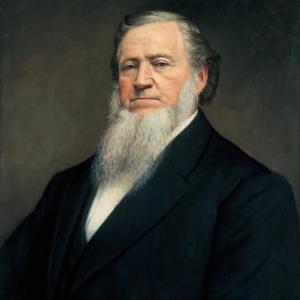
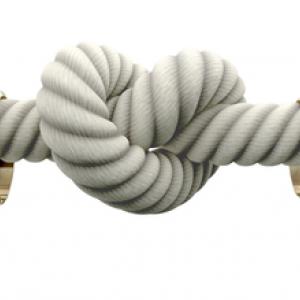
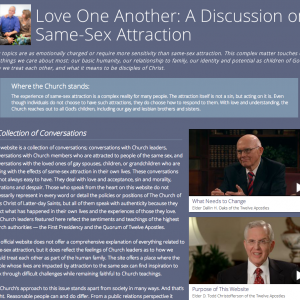

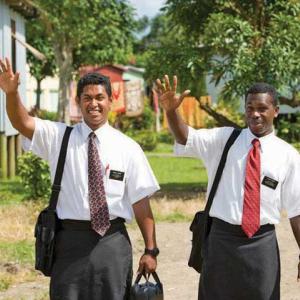
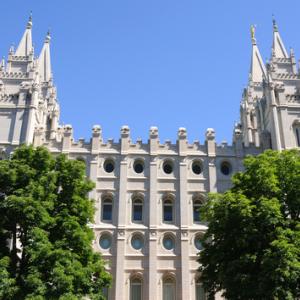
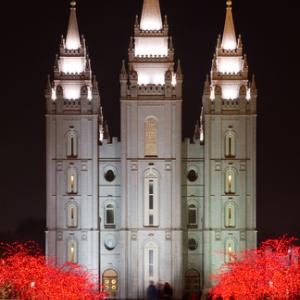
![The Salt Lake Temple worship site. RNS photo by Carol M. Highsmith [Public domain] via Wikimedia Commons RNS photo by Carol M. Highsmith [Public domain] via Wikimedia Commons](https://sojo.net/files/styles/large_square/public/blog/thumbRNS-MORMON-NUMBERS050412a_0.jpg)
